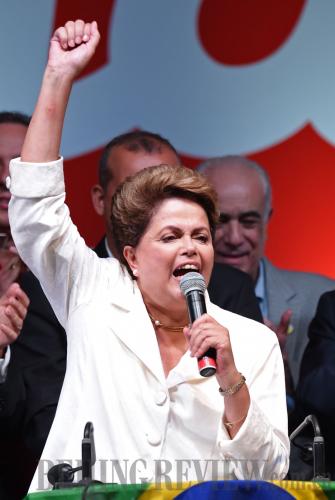 |
|
VICTORY: Reelected Brazilian President Dilma Rousseff delivers a speech following her win in Brasilia on October 26 (XINHUA/AFP) |
Reelected Brazilian President Dilma Rousseff pledged to boost her country's economy and advance political reform during her second term in a victory speech soon after the final results of the election were announced on October 26. After taking the most bitterly contested presidential race in the country in over a century, Brazil's Iron Lady has seemingly kept a very clear mind about what the tight race means for her and what Brazilians are demanding for the future.
Slim victory
The final result shows that the 66-year-old Rousseff garnered 51.6 percent of the vote in the late October run-off election while her rival, Aecio Neves of the Social Democratic Party (in Portuguese, the Partido Social Democrático, or PSD), obtained 48.4 percent. Observers noted that such a narrow gap indicates that a high percentage of Brazilian voters are demanding change from the economic slump of Rousseff's first four-year term. However, the 12 years of rule under the left-wing Workers Party (in Portuguese, the Partido dos Trabalhadores, or PT), to which both Rousseff and her presidential predecessor Luiz Inacio Lula da Silva belong, gained considerable public support for the Iron Lady's second term.
"The sluggish economy in Brazil in recent years has spurred people's aspirations for change," said Sun Yanfeng, Assistant Director of the Institute for Latin American Studies under the China Institutes of Contemporary International Relations (CICIR). "In addition, following the expanding of the country's middle class, the political demands of voters are also changing, which helped PSD's Neves snatch some voters away from Rousseff."
Brazil's economic growth has witnessed a sharp decline over the past four years. In 2010, when then-President Silva turned the reins over to Rousseff, Brazil's economic growth rate was at 7.5 percent. Since the latter took office, however, the country's GDP increased by only 2.7 percent in 2011, 1 percent in 2012 and 2.3 percent in 2013. Brazil's central bank forecasts this year's figure at just 0.27 percent.
Meanwhile, the inflation rate has been higher than expected since 2010. A recent report from the Brazilian central bank stated that economists at respected financial institutions had elevated this year's inflation expectations to 6.45 percent, approaching the government's official target of 6.5 percent.
Despite recent economic woes, the 12-year rule of PT brought tangible rewards to the country's middle- and low-income people by lifting more than 30 million residents out of poverty, cultivating a large new middle class.
Zhou Zhiwei, a Brazilian studies researcher at the Chinese Academy of Social Sciences, told Beijing Review that PT's care-for-the-people policy most benefited the lower classes, which formed its base of core supporters.
"Many people worried that Neves would follow former President Fernando Henrique Cardoso's suit in his economic policies if he came to power," Zhou said. Though Brazil achieved a relatively rapid economic growth rate in the Cardoso era, the chaotic nature of economic and social order at that time deeply affected the lives of those in middle and lower classes, Zhou added.
Challenges and reform
The near edging out of Rousseff undoubtedly means more challenges for her in the second term. Before the vote, Brazil's stock market and currency slumped when polls showed a Rousseff win as likely. Ratings agencies have also warned that a looming credit downgrade is possible unless Rousseff makes hefty spending cuts to correct deficits that have mushroomed in recent months.
"Facing Rousseff now are two major tasks. And the first one is to win back people's market confidence and investor confidence," Zhou said.
Zhou noted that while the influence of a global downturn is believed to be a contributing factor to the recession of Brazil, Latin America's largest economy, more focus should be turned toward internal causes.
| 